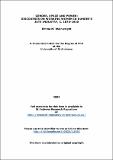Files in this item
Gender, space and power : discourses on working women in Dundee's jute industry, c. 1870-1930
Item metadata
| dc.contributor.advisor | Clayton, Daniel Wright | |
| dc.contributor.author | Wainwright, Emma M. | |
| dc.coverage.spatial | x, 336 p. | en_US |
| dc.date.accessioned | 2018-01-10T09:12:53Z | |
| dc.date.available | 2018-01-10T09:12:53Z | |
| dc.date.issued | 2002 | |
| dc.identifier.uri | https://hdl.handle.net/10023/12450 | |
| dc.description.abstract | This thesis explores the discourses on working women in Dundee's jute industry c. 1870-1930. It examines how working women became knowable and visible, and some of the ways in which women negotiated the relationships of power within which they became placed. Dundee was dubbed 'a woman's town' because of the central role that women played in the city's jute industry. Although a recent range of historical scholarship has started to ask new questions about women's identities and experiences of work, this study stresses the importance of engaging more widely with questions of geography, gender, discourse and power-knowledge. I explore how working women were observed, represented and categorised through a variety of material spaces - mills and factories, streets and homes, and through a range of conceptual spaces - economic, philanthropic and medical. The thesis focuses on the very processes and gendered discourses through which working women were made known - the practices of domination and resistance, and surveillance and control, and the different forms of knowledge production, including journalism, accountancy and philanthropy. Particular attention is paid to the ways in which divisions between work and home, and boundaries between public and private, were affirmed, reaffirmed and contested by working women and other urban actors. It is suggested that the work of Michel Foucault and a wider range of geographical and feminist theory provide us with a particularly rich and pliable set of conceptual resources with which to probe working women's geographies and the processes of power-knowledge, in the Dundee context. I suggest that the web of discourse that produced Dundee's working women as objects of concern was aimed not at preventing women from working, but at scrutinising and managing every aspect of their lives. | en_US |
| dc.language.iso | en | en_US |
| dc.publisher | University of St Andrews | |
| dc.title | Gender, space and power : discourses on working women in Dundee's jute industry, c. 1870-1930 | en_US |
| dc.type | Thesis | en_US |
| dc.contributor.sponsor | Owen Silver Fund | en_US |
| dc.contributor.sponsor | University of St Andrews. School of Geography and Geosciences | en_US |
| dc.type.qualificationlevel | Doctoral | en_US |
| dc.type.qualificationname | PhD Doctor of Philosophy | en_US |
| dc.publisher.institution | The University of St Andrews | en_US |
This item appears in the following Collection(s)
Items in the St Andrews Research Repository are protected by copyright, with all rights reserved, unless otherwise indicated.

